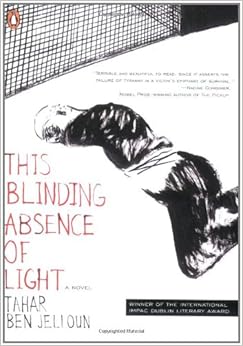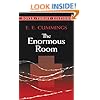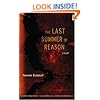


Flip to back
Flip to front

This Blinding Absence of Light Paperback – January 31, 2006
See all 6 formats and editions
Hide other formats and editions
| Amazon Price | New from | Used from |
|
Hardcover, Bargain Price
"Please retry"
|
$9.58 | $9.87 |

$13.50
FREE Shipping on orders over $35.
Only 3 left in stock (more on the way).
Ships from and sold by Amazon.com.
Gift-wrap available.
NO_CONTENT_IN_FEATURE
Tell the Publisher!
I'd like to read this book on Kindle
Don't have a Kindle? Get your Kindle here, or download a FREE Kindle Reading App.
I'd like to read this book on Kindle
Don't have a Kindle? Get your Kindle here, or download a FREE Kindle Reading App.
Best Books of the Month
Want to know our Editors' picks for the best books of the month? Browse Best Books of the Month, featuring our favorite new books in more than a dozen categories.
Want to know our Editors' picks for the best books of the month? Browse Best Books of the Month, featuring our favorite new books in more than a dozen categories.
Product Details
Would you like to update product info or give feedback on images?.
|
Editorial Reviews
From Publishers Weekly
Based on an incident involving starvation and torture in Morocco, Prix Goncourt-winner Jelloun's latest novel is a disturbing, grisly account of how a prisoner survived a 20-year internment in which he was locked away in a desert tomb. The narrator, Salim, was captured during an unsuccessful 1971 attempt to overthrow Prince Hassan II, who then secretly sent his enemies off to an isolated, makeshift prison. The conditions approached the horror of a concentration camp: the prisoners were confined in dark, cramped chambers, fed a subsistence-level diet and given no medical attention. They were allowed to communicate, however, which helped them cope with such ghastly tortures as having scorpions thrown into their cells. In one particularly hellish incident, a prisoner who breaks his arm is devoured by gangrene and cockroaches. Jelloun writes eloquently and poignantly about the prisoners' various coping tactics, from Salim's recitation of half-remembered stories from The Arabian Nights and scripts from American films to a memorable section in which a dove lands in one of the cells and is passed from inmate to inmate. Freedom eventually comes with bribing a guard, resulting in the intervention of activists from Amnesty International, but this harrowing tale of deprivation and degradation is a frightening reminder of man's seemingly boundless capacity for evil. (May 1)Forecast: Jelloun, a high-profile novelist (Corruption) and critic in Europe who writes regularly for the major dailies of several countries, will likely be feted by intellectual journals in the U.S., but chances are this novel won't receive the kind of attention it did in France, where it was a bestseller, despite heightened interest in human rights and the Arabic-speaking world.
Copyright 2002 Cahners Business Information, Inc. --This text refers to the Hardcover edition.
Copyright 2002 Cahners Business Information, Inc. --This text refers to the Hardcover edition.
From Booklist
Bookish Salim joins the Moroccan army without enthusiasm and is shocked first to find himself in the midst of an unsuccessful coup against King Hassan II in 1971, then to be imprisoned in what is essentially a tomb. He can't stand upright in his tiny, bitter cold, and utterly lightless cell, and can only communicate through the walls to his fellow sufferers. Years of suffocating darkness and near-starvation grind slowly by as innocent men die in unspeakable anguish. Salim surrenders his cramped, famished body to its fate, and concentrates all his energy on preserving his mind, praying and meditating with such intensity that his lucidity and discipline, along with the stories he tells, infuse his comrades with their only hope. Tragically, renowned novelist and essayist Ben Jelloun based this wrenching yet exquisite tribute to the "supreme light" of the human spirit in the face of "infinite cruelty" on actual events, hoping that by telling this painful tale with respect and empathy, by finding a transcendent beauty in suffering with dignity, resistance, and spirituality, he might combat ignorance and brutality. Donna Seaman
Copyright © American Library Association. All rights reserved --This text refers to the Hardcover edition.
Copyright © American Library Association. All rights reserved --This text refers to the Hardcover edition.
More About the Author
Discover books, learn about writers, read author blogs, and more.
Customer Reviews
Most Helpful Customer Reviews
8 of 8 people found the following review helpful
By
R. J MOSS
on September 25, 2005
Format: Hardcover
Comment
Sending feedback...
The descriptor,'awesome', assumes unique resonance with this book. In 1971 a Morroccan military insurrection failed in its bid to overthrow the monarchical rule. Over 50 soliers were tried and this chronicles a 'pilgim's progress' of the subsequent imprisonment. Only four of our narrator's comrades in their subterranean cell block survived the 18 years of cramped darkness. Their bodies shrank. Their teeth rotted.The means of attrition are appalling. We hear the deaths occuring around them. Strangely, as I worked through this revelatory account, I gradually recognised the voice of displacement, insight and rigour I'd encountered as an adolescent whilst reading Camus', L'Stranger'. A mere 10 pages after this familiarity crystallised, our narrator indeed arrives at his recollections of the Camus piece, 'reading'it, as he did many other literary samples, to sustain his fellows. That said, this is one powerful piece of writing. Tahar Ben Jelloun has sourced the story from one of the four survivors. Authors may have succeeded in fictionalising such a scenario. But I know of none that have charted the painful disintegration of body and soul under extremis. War traumas, plane crashes in the Andes, spiritual revelations through self-imposed deprivations, fictions like Jim Crace's,'Quarantine', with all their virtues, will be assessed against the quality of this narrative. It is an astonishing triumph for man and his imagination.
Thank you for your feedback.
If this review is inappropriate, please let us know.
Sorry, we failed to record your vote. Please try again
8 of 8 people found the following review helpful
By
Jed Verity
on February 2, 2008
Format: Hardcover
Comment
Sending feedback...
It's hard to describe the impact of this book. Told in a very straightforward manner, it generally lets the events speak for themselves, veering closer to and further from non-fiction again and again as the narrative unfolds. There are times when it is so grim and relentless that it is hard to keep reading, but a great reward awaits the reader who persists, as this is not a story about the depths of human suffering and cruelty but about the depths of human resilience and compassion, which are deeper still. I read this years ago and have never been able to shake its impact, nor have I wanted to. It's a treasure to cherish.
Thank you for your feedback.
If this review is inappropriate, please let us know.
Sorry, we failed to record your vote. Please try again
5 of 5 people found the following review helpful
By
Nancy O
VINE VOICE on March 24, 2010
Format: Paperback
Verified Purchase
Comment
Sending feedback...
Ben Jalloun's novel is based on the story of one Aziz Binebine, who was sentenced to a 20-year stretch of time in the hellhole prison of Tazmamart for his role in the 1971 attempted coup of King Hassan II's Moroccan government. The novel is fictional, but the underground prison of Tazmamart and living conditions there (it is now destroyed) are not.
The book examines the story of one character, Salim, who like his fellow cadets from the coup attempt, was sent to this horrible place. Their "home" was an underground cell, so small that even something as ordinary as sitting was an impossibility. Cockroaches and scorpions were co-inhabitants, as was the constant darkness. The food kept the prisoners alive, but just barely. Many of the prisoners turned to their faith in Allah and to the Qu'ran to make it through their ordeal, while Salim turned deeply inward, letting go of both memory, because "to remember was to die," and of the physicality of his body.
This Blinding Absence of Light is one of those books you must actually experience for yourself -- book reviews and descriptions of it can't really do the story justice. If you have a low tolerance for human despair, or you're in the mood for something happy, forget this one. Difficult to read at many points (and on many levels), this book left me considering the cruelty that can more often than not accompany power. It's also a reminder that in some cases, Hell already exists on earth.
The book examines the story of one character, Salim, who like his fellow cadets from the coup attempt, was sent to this horrible place. Their "home" was an underground cell, so small that even something as ordinary as sitting was an impossibility. Cockroaches and scorpions were co-inhabitants, as was the constant darkness. The food kept the prisoners alive, but just barely. Many of the prisoners turned to their faith in Allah and to the Qu'ran to make it through their ordeal, while Salim turned deeply inward, letting go of both memory, because "to remember was to die," and of the physicality of his body.
This Blinding Absence of Light is one of those books you must actually experience for yourself -- book reviews and descriptions of it can't really do the story justice. If you have a low tolerance for human despair, or you're in the mood for something happy, forget this one. Difficult to read at many points (and on many levels), this book left me considering the cruelty that can more often than not accompany power. It's also a reminder that in some cases, Hell already exists on earth.
Thank you for your feedback.
If this review is inappropriate, please let us know.
Sorry, we failed to record your vote. Please try again
9 of 13 people found the following review helpful
By
A Customer
on November 22, 2002
Format: Hardcover
Comment
Sending feedback...
I picked this book up from the libary and entered a world where untold cruelty and human suffering were a daily part of life. I finished this book about a week ago, and it is still affecting me. No longer do I complain or feel sorry for myself. It is a story that needed to be told. Put this on every American's "to read list" as after you read it, you will never be the same.
Thank you for your feedback.
If this review is inappropriate, please let us know.
Sorry, we failed to record your vote. Please try again











